| Dangerous Birds | Uzi | Live Skull | Come | Solo | E |
Dangerous Birds
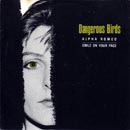 Dangerous Birds – Alpha Romeo 7″ (1982, Propeller Records)
Dangerous Birds – Alpha Romeo 7″ (1982, Propeller Records)
This seven-inch record contains the majority of Dangerous Birds’ formally recorded output, and nowadays copies are a rare find. Bouncy bass playing propels the poppy “Alpha Romeo,” while bright and jangly guitars are swept along for the ride. Lori Green’s vocal delivery recalls Belinda Carlisle, both in timbre and in its interplay with the voices of the other band members. It’s an impressive performance.
On the flipside is Zedek’s aggressively sinister “Smile on Your Face,” an obscure gem of the era. The musicianship, songwriting, and arrangement are breathtaking, and the song is jam-packed with euphonic details — percussive accents, instrumental breaks, sparsely utilized harmonies. Zedek growls, screams, and sings grim lyrics against a hook-laden wall of sound that transcends its punk roots, betraying Spanish and Middle Eastern influences. Stylistically, it stands in stark contrast to the A-side; together, both songs represent Green’s and Zedek’s divergent aesthetics. (Anna)
Other:
- “Catholic Boy,” appeared on 1981 cassette-only Propeller Records compilation (Thalia was backed by a studio-only lineup)
- “Emergency,” appeared on Laughing at the Ground compilation (1982, Propeller Records)
Uzi
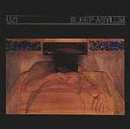 Uzi – “Sleep Asylum” (1986, Homestead Records; reissued 1994, Matador Records)
Uzi – “Sleep Asylum” (1986, Homestead Records; reissued 1994, Matador Records)
After the demise of the Dangerous Birds, Thalia Zedek vowed to play more “violent” music, and Uzi’s darker sound fits the bill. Opening with eerie tape loops and squalling feedback before launching into the first of its six songs, Sleep Asylum sounds as modern today as it probably sounded futuristic during its recording in the mid-1980s. By the time it was released by Homestead in 1986, the band had broken up. Matador reissued the record in 1994, although that too has gone out of print. While the new millennium did not bring us a third printing of Sleep Asylum, it did see the advent of the Internet’s ubiquity – used copies of the recording are easy enough to find through various online retailers these days.
Uzi’s sound is largely defined by crystal-clear bass lines that contrast sharply with distorted guitars and their feedback, and Phil Milstein’s diverse tape effects provide further texture. The sum of these parts ultimately culminates in densely layered and provocative pieces that engage both the visceral and cerebral sides of the imagination. Zedek’s vocals are sung as well as looped at various speeds, and her lyrics are for the most part vague while leaving an ominous aftertaste. And, while the liner notes contain a lyric sheet, there are a lot of words sung that do not appear in print.
“Criminal Child,” the record’s ear-catching opener, features verses accompanied by droning guitar and accented by distorted strumming between vocals. As the song approaches its ending, tape sounds of gunshots and chainsaws are interspersed with a female voice that was likely lifted from a relaxation tape. This woman’s exhortations to relax segue nicely into “Pale Light,” the calming sounds of dripping water acting as a sort of arrhythmic auxiliary percussion. It is the closest anything on this album comes to a ballad; it is slower in tempo and sad in spirit, the lyrics painting a picture of a frigid and empty winter.
Perhaps the strongest song on the record, “Gabrielle” is propelled by Danny Lee’s largely minimal but off-kilter drumming, the melody defined mostly by Randy Barnwell’s bass lines that rise above the guitars’ clashing chords. Male backing vocals take the song to a greater level as the musical climax approaches. Session musician Dave Shibler picks up on bass in “Ha Ha Ha” (he also performs on “Criminal Child”), anchoring the wild ringing of multiple guitar strings with his steady plucking. As the guitars gain coherence, so does the song’s emotional intensity.
Clocking in at nearly seven minutes, “Collections” is the lengthiest song on the recording, but lyrically the briefest. Guitar-driven (with hints at what was to come between Zedek and her future six-string dueling partner, Come’s Chris Brokaw) and instrumental for the first two-and-a-half minutes (save for the highly distorted taped voices in the background), the piece arrives at a jazzy interlude that includes both Zedek’s vocals and live trumpet provided by Tim Sprague. Curiously, the lyrics continue a theme that was present in “Ha Ha Ha”: obscure references to misplaced or hidden keys.
“Underneath,” which closes the album, was left off of the original Homestead release of Sleep Asylum. Good thing that the Matador version is easier to find, as it’s a good song and fine closer. The surreal lyrics are confidently delivered and the instrumentation ebbs and flows, bringing the record to a gentle conclusion.
The liner notes of the Matador reissue teasingly refer to the “songwriting peak” that the band reached after the recording of Sleep Asylum was finished; sadly, it seems as if these songs have been claimed by time. Maybe some dusty bootleg tapes exist in someone’s basement somewhere, but the rest of us are out of luck. Tension between Zedek and drummer Lee led to the band’s breakup before any of this newer material could be recorded. (Anna)
Live Skull
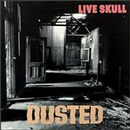 Live Skull – “Dusted” (1988, Homestead Records)
Live Skull – “Dusted” (1988, Homestead Records)
Live Skull were an established NYC-based no-wave band when Thalia Zedek joined in 1987, fresh from Uzi’s breakup. Prior to Zedek’s involvement, guitarist Mark C and bassist Marnie Greenholz shared vocal duties, but, wishing to concentrate on their instruments, they recruited Zedek as the band’s new frontperson.1988’s Dusted, recorded with Martin Bisi, is the missing link between early Live Skull and late-period Live Skull; the album showcases the transition between the two incarnations of the band. While Zedek performs on most songs, Mark C and Greenholz still sing lead on a few of them. Additionally, original drummer James Lo only plays on five songs; the rest feature Rich Hutchins, who kept the beat until Live Skull’s 1990 demise.
The focal point of Live Skull’s sound was the musical interplay between guitarists Mark C and Tom Paine. Their individual guitar parts would periodically diverge and reunite, alternately providing melodic counterpoints and then coming together for clear blasts of synchronized noise. Greenholz skillfully maneuvered her way through the guitars’ tangled web, her bass lines grounding the band’s sound rhythmically along with the drums. The original vocalists seem to favor deadpan deliveries, Zedek’s vocals are livelier and border on the smoke-damaged, and the lyrics tend toward darker fare.
The guitars ring loud and clear on the relatively high-BPM opening track, “Machete.” Zedek’s voice has a gravelly edge that matches the intensity of the instrumentation. Other bright spots include the menacing “Kream,” the lush and multilayered “Back to the Earth,” and the alternately prickly and forceful “Dusted Drummer.” Also worthy of mention is “Alive Again,” with seemingly Patti Smith-inspired poetry sung over crashing and colliding six-string sounds. Zedek’s vocals here are judiciously overlapped to good effect.
Greenholz’s and Zedek’s voices are eerily similar and I am not confident in my ability to tell them apart. So take it with a grain of salt when I claim that Greenholz takes the mike on four songs: “Dusted Part 2,” “X w/ the Light,” “Fat of the Land,” and “Pusherman.” “X w/ the Light,” while slightly repetitive, is one of the strongest tracks on the album. The vacillation in volume between quiet and loud and the drum-free instrumental breaks create a moody and tense dynamic. “Pusherman,” a gloomier and doomier iteration of the Curtis Mayfield classic, is another standout. Mark C sings evenhanded vocals on the uptempo but foreboding “Debbie’s Headache.”
While Dusted lays bear the evolution from early- to late-period Live Skull, it can take awhile for the listener to be able to distinguish some of the songs from one another. While the sound is clearly defined and the musicianship is solid, the songwriting itself is a bit murky and it wasn’t until the following recordings, Snuffer and especially Positraction, that the Zedek-helmed Live Skull really found its footing. Dusted sets a complex and mysterious mood, but next year’s Positraction was truly explosive. (Anna)
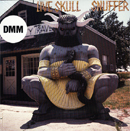 Live Skull – “Snuffer” EP (1988, Caroline Records)
Live Skull – “Snuffer” EP (1988, Caroline Records)
Snuffer was the second Live Skull release to feature the vocals of Thalia Zedek, and the last on which original bassist Marnie Greenholz played. Her bass lines hold all six songs together, creating a foundation over which two distorted guitars have the space both to duel and intermingle with one another. Vocally, Zedek moves in a continuously aggressive direction, her lyrics often unintelligible. As a band, Live Skull find a balance here in their chemistry with Zedek — one that wasn’t so apparent on Dusted, the first recording they made with her. The instrumentation and the vocals all meld together into one cohesive, mellifluous whole.
“Face” and “Chair” are slower and more melodic. They may be in danger of bleeding together, but upon repeated listenings each song’s uniqueness comes to the forefront. “Step” might be the EP’s best song; it’s more structured than the others, while still retaining the spontaneity that make Live Skull so much more stimulating than the next band. Zedek’s sing-song vocals and the fun-house-mirroring guitar solos make it a real treat.
“Word” is more abstractly structured, with perky instrumentation and a brisk beat. I’ve always wondered what the hell these lyrics are about; I have the sneaking suspicion they’re about the abortion issue, which strikes me as odd since Zedek’s other lyrics seemed to avoid political discussion (at least up until 2008’s Liars and Prayers).
The closing track, “Straw,” is a menacing duet between Zedek and guitarist Mark C. The male/female vocals complement each other beautifully, and the song sounds almost gothic.
While a couple of the songs suffer a bit from mild sluggishness, all in all this is a solid record that hints at the greatness that was to come in the form of Positraction. (Anna)
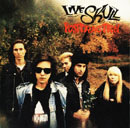 Live Skull – “Positraction” (1989, Caroline Records)
Live Skull – “Positraction” (1989, Caroline Records)
Over the course of a decade, Live Skull reincarnated themselves on each album, eventually attaining nirvana with the release of their swan song, Positraction. One guitar’s jagged line is hooked by the other’s; their notes wrap around one another like vines weaving through a trellis. The bass is used less as a rhythm instrument as it is for an additional source of melody; still it anchors the chaos of the angular guitar interplay. As the music teeters back and forth between a breakneck speed and a mid-speed tempo, Thalia Zedek purges her inner-demons with lyrics and a vocal delivery that are intensely passionate, simultaneously aggressive and vulnerable. Her gritty voice is spewed through an audible sneer, her lyrics bespeaking the swirl of emotions that comes hand in hand with a tumultuous breakup. It is upon listening to this album that the astute listener might notice an emerging pattern: Zedek’s best work seems to gush out of her, like the waters of a fountain, every time she is crushed by the painful disintegration of a romance. (As she once admitted in an Advocate interview, “I feel like all my records are breakup records. I put out a record every few years. At some point during that time, a relationship ends!”)
“Circular Saw,” the opening track, is heralded by a thrice-whacked snare, immediately after which the rest of the band lurches into action. Frenzied drumming catapults a delirium of screeching guitars, which clamor noisily like an ambulance’s sirens while Zedek sings of loneliness and isolation: “There’s a place/ Left for you/ In my mind/ Like a hole/ That never closed/ Or got filled in.” Clocking in at just over two minutes, it is a short, energetic spurt of rhythmic guitars and rapid-fire drums.
Probably my favorite pair of songs on the album is “Hit & Sink” and “Demon Rail.” First, “Hit & Sink” opens with the resonant squalls of singular guitar notes hovering over a blanket of distortion. Underneath is the constant repetition of a jaunty descending bass line. Zedek sings throughout, her words given periodic emphasis by blasts of percussive accompaniment. The song ends as abruptly as Zedek is bowled over by an epiphany, the last syllable out of her mouth accompanied by the last instrumental strokes and strikes: “And that’s when it hits me/ How could you ever have missed me/ And it hits me like that/ And it feels like shit.” Then, silence, as those last four words sink in. The jagged chords that open “Demon Rail” serve as a short introduction before the drums kick in and Zedek yells her lyrics, her throat almost torn up, her voice nearly hoarse. If she felt like shit on “Hit & Sink,” here she elaborates on the physical pain that can accompany heartbreak, the psychosomatic contortion of one’s insides by “the hands of a demon.” This is probably the mostly aggressively she’s ever sang, though that bravado is perhaps used to mask her vulnerability.
The syncopated beats and the creepily dulcet bass of “Disengaged” lay a foundation for Zedek’s remorseful delivery. Zedek bitterly accepts the demise of her relationship, which she now characterizes as a hook that skewered her after enticing her with a savory piece of bait. “Please throw me back,” she asks, now that she has wrenched herself free of the barb that had her trapped. But although she has been liberated from that hook, the wounds that it left have yet to heal.
“Safe From Me,” a somber sing-along rich with melodious guitar interaction and impassioned vocals, is the standout track, lyrically as well as musically. Now that Zedek is ready to be thrown back into the murky waters of singledom, she struggles to complete the process of her separation from a formerly joined-at-the-hip paramour: “Honey, I’m sorry that I’m still here/ I guess it takes awhile/ To disappear.” Cutting those ties is difficult, but something she is compelled to do — in her remorse, she feels like a “poison,” her very presence a toxin tainting her ex’s life. This is something most of us can relate to, retaining an immense care for someone on the one hand, but on the other hand being so ridden with guilt or regret that we feel as if our very presence can contaminate that person’s life. So we quarantine ourselves, keeping that person “safe” from us. It’s an awful way to feel — it feels like shit! The sparse poetry of the lyrics conveys that feeling succinctly and sadly.
The five musicians of Live Skull attain a dense musical cloud in the closing track, “Caleb.” Bassist Sonda Andersson uses a violin’s bow on the strings of her bass, creating a thick orchestration that underlies distorted guitarplay and the shrill cries of Zedek’s clarinet. A soft percussion commences as the bow is put away, giving way to the emergence of a pretty bass line and a slow build into the song’s body, the lush instrumentation complementing the wistful vocals. It would be nice to say that, by the album’s final track, Zedek’s lyrics at last suggest a sense of closure. But although she displays an acceptance of her situation’s reality, wisely though pessimistically positing that “Love doesn’t reverse/ Just finds somewhere else to feed,” a lingering bitterness is still apparent in her insistence that she has been repeatedly lied to. When the vocals stop, the bow is put back to the bass’ strings and the song returns to its crawling tempo, creating a funereal end for an altogether moody album.
The CD release contains a bonus track, “Paul Revere’s Bush (Tree Girl),” which on one hand sort of wrecks the perfect finale offered by “Caleb.” On the other hand, it acts as an apropos segue to the six songs of the Snuffer EP, which are also appended onto the end of the compact disc. (Anna)
Other:
- Tri-Power,” appeared on Like a Girl, I Want You to Keep Coming compilation (1989, Rough Trade)
- Live Skull – Live video – 4-22-89, with interview, Fort Worth, Texas (1989, Videophile)
- John Peel Sessions (unreleased?)
Come
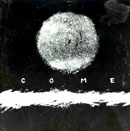 Come – “Car” EP (1991, Sub Pop Records)
Come – “Car” EP (1991, Sub Pop Records)
Come’s debut EP opens in a blaze of gory as an ominous roar of two distorted six-strings and a bass pummels the soundscape. A few seconds later the drums kick in, and gradually the molten mess cools off into glowing ingots of insistent beats. Torturous feedback evaporates into a suspenseful pulsation, and Thalia Zedek steps up to the mike. “I’m gonna drive you home …” Fasten your seatbelts and close your eyes!
The three songs on this EP provide a thumbnail picture of Come repertoire that would follow, and all of them showcase the compelling lyrics of Zedek in different ways. “Car” is a put-out-or-get-out rant by the character voiced by Zedek who craves the passenger in her car, a passenger who is ambivalent at the least (more likely, paralyzed with fear). But is the passenger a tease, deserving of Zedek’s scorn, or a victim trapped by the rather pathetic, self-loathing bully at the wheel? This is left ambiguous, as we hear only Zedek’s side of the conversation. The first chorus finds Zedek pleading “I love you, I want to set you free” — the only time in all of Come’s lyrics where love is proclaimed with such abandon — while in the second she screams “I don’t have the patience for this shit.” The denouement is soft, however, as she resignedly accedes: “Baby I’m gonna drive you home/ Back to your friends and loved ones/ Where you’ll be safe and warm/ And there will be no shame/ Don’t be afraid.” Hmmm, are there any other words in the English language more frightening than “Don’t be afraid”? You just know the driver is reaching under her seat for a butcher knife.
The next song, “Last Mistake,” opens with a melancholy harmonica solo by Zedek layered on top of Brokaw’s delicious, haunting guitar. This song — like “Car,” unreleased on any of Come’s full-length albums — is a heartbreaking paean to collapsed dreams. “Yeah, I was set up/ By a dear memory/ Pushed so hard and fast/ Into my mind/ It grew over like skin.” But like all great rock and roll, redemption is implicit in all that lovely cacophony propelling the anguished lyrics; no one is truly broken who can still make this much noise. The final song, “Submerge,” is an alternate take of that which opens the album Eleven:Eleven. This version is slightly faster and less controlled but has the exciting charm inherent to early cuts.There were two EPs from New England that totally thrilled me in the early ’90s, this one and Scarce’s Red. Come’s debut EP is difficult to find but is necessary listening for any rock fan. (Marc Sommer)
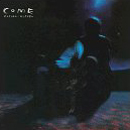 Come – “Eleven:Eleven” (1992, Matador Records)
Come – “Eleven:Eleven” (1992, Matador Records)
This was Come’s debut album and, in my opinion, their strongest. Come’s brand of abrasive blues is defined by distorted, tightly interlocking guitars and minor keys. At times it seems surreal what they can do with two guitars and staggering tempos. The band’s dynamics are tight but not slick; each track is meticulously arranged yet the sound is raw.
Lyrically, singer/guitarist Thalia Zedek continues her career-long theme of alienation and half-empty cups. This album arose from what was probably the lowest point in Zedek’s life, and just one listen makes that painfully obvious. But the dismal subject matter is elevated to transcendence — I can’t think of any music that plays on so many emotions; sometimes it can bring tears to my eyes. Gloomy though it is, there is an evident flicker of hope underlying the dark overtones — after all, Zedek survived her stint at Rock Bottom and is here to tell you about it.
Musically, this is the blues, not so much in structure but in the feelings it evokes. The crashing guitars and pulsating rhythm section drive Zedek’s anguished, gritty vocals, the tempo often slowing down and then speeding back up, driving home the words’ meanings that much further.
At the outset, you are plunged into a dense blues that builds into an unwavering sonorous assault in “Submerge.” As Zedek croons for her listener to “just relax,” you gasp for air, unable to follow such an order. “Dead Molly” is opened by the call and response of two guitars, which eventually mingle together under a 3/4 time signature pounded out by drummer Arthur Johnson. The experience assaults the senses from all sides, the herky-jerky tempo changes leaving your entire body twitching helplessly to the beat. Continuing this trilogy of sonic intensity is “Brand New Vein,” its melancholy mood accentuated by a piano’s resonant tones. Two minutes into the song, a climax is almost reached when the band all but comes to a grinding halt, teasing you with a few muted guitar scratches and the tap of a cymbal. Then, slowly, they pull you back in again, only to slow back down two minutes later, finally working you back up to an explosive finale. Together, these first three songs will leave you weak and breathless.
Afterward, the mind needs a brief refractory period, and this is provided by nearly three minutes of Zedek’s and Chris Brokaw’s guitars intertwining with one another in peaceful quietude. Then the rhythm section bursts back onto the scene, pummeling you with the unrelenting sonic punch of “Off to One Side.” This segues into the gentle thrust of “Bell,” which tips you over the edge into a musical oblivion. The next two pieces, “William” and “Sad Eyes,” are a bit more traditionally structured than the rest, though they’re still anything but vanilla. The rollicking garage rock of “William” is fed through a sludgy blues filter; “Sad Eyes” finds Zedek and Brokaw entrenched in the song’s somber styling, trading off vocal duties while the listener is engulfed by the guitars’ moaning laments.
Beginning with “Power Failure” and continuing into the following song, the tempo gradually lurches back into the fierce propulsion that characterizes the album. Slowly, you lose your breath and are immobilized, bound by the bewitching pandemonium that propels “Power Failure” into its ultimate discordant dissonance. A thick bass line lays a solid foundation for the chaotic violence of the scratching and crashing guitars in “Orbit.” As Zedek sings of out-of-body experiences, you in turn transcend your body’s physical limits, the swirling strains of seventh chords and vigorous percussive pounding launching you into another state of consciousness. You yield to the tempo, which is “just the right speed,” and before you know it, you, too, are in orbit, flying “much too high.” Abruptly, the song ends, fading out into the squall of a single guitar. Here, it is all you can do to catch your breath, as you have just been absolutely ravaged by the concentrated fervor of the nine songs of Eleven:Eleven proper.
Tacked onto the end of the CD release are “Fast Piss Blues” and “I Got the Blues,” previously available on Come’s first single on Matador. It is an exceptionally strong pair of songs that fits right into the rest of Eleven:Eleven’s material. The former boasts lyrical themes of rootlessness and alienation, while the latter kidnaps a Rolling Stones tune and makes it Come’s own.
The album is probably the most cohesive that I’ve ever heard. Instead of having one or two standout tracks floating in a musical ocean of mediocrity, all 11 songs function together as a unit, each piece a continuation of the one before it. It’s not enough just to listen to one song here and one song there — this is heavy stuff that must be heard while lying supine in the dark, the listener absorbing every little detail.
Reading over what I have written, I feel like I have failed miserably in describing this album. I have told you about the lyrics — they’re the opposite of happy-go-lucky — and I’ve told you about the music — a thundering rhythm section accented by the sinister sounds of dueling guitars. But it is impossible for me to convey the powerful emotional — and even physical — impact this album has on me, and that impact is the most important aspect of the album. It must be felt to be understood. (Anna)
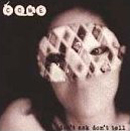 Come – “Don’t Ask Don’t Tell” (1994, Matador Records)
Come – “Don’t Ask Don’t Tell” (1994, Matador Records)
OK, you surrendered to the heroin of Eleven:Eleven, and the lovely thing about an album — unlike real narcotics — is that you can partake in its warm pleasures any time you want with no consequences. So after obsessing with that masterpiece for a few months you feel it may be safe to set it aside (but always within sight!), and you dip into its curious, brown, bemasked successor, Don’t Ask Don’t Tell. With the first whack of Arthur Johnson’s snare acting as a starter’s pistol, you know everything will be different. Whereas Eleven:Eleven opened with Chris Brokaw’s pick gently clicking across muted strings, melting into buzzy chords and intimate sliding notes while Thalia Zedek and the rest of Come began sidling up to seduce you — “just relax, just relax …” — this second child in the Come family of full-lengths gets all aggressive on your ass, right away. “Finish Line” jumps off the blocks at a powerful, straight-ahead pace unlike anything on Eleven:Eleven. The song seems atypically simple at first, but after only 20 seconds it makes its move: You can barely hear a subtle treading on a guitar pedal, like a bare foot finding your calf under the table — the surprise jolts you, anticipation sharpens your nerves, and that cute person across the clutter of plates becomes the only thing you notice in the entire crowded room. A crescendo begins (look at that smile), cacophony grabs you (what a laugh!), and then it all whumps to a beautiful pause at second 27 (eye contact). From then on the beauty of Come owns you.
Don’t Ask Don’t Tell has to be appreciated on its own terms; it is not Faulkner’s “The Sound and the Fury,” all hypnotic, time-shifting, and introspective like Eleven:Eleven, but rather it is more like a collection of short stories. This is an album about relationships and exhaustion. Sleep is its main theme — the longing for it, the peace provided by it, and the dreams that saturate it. Two of the songs seem especially hallucinatory. “Finish Line” is a race that devolves into stops and starts and accusations, with lovers arguing about false starts while everyone else waves impatiently from up ahead at the tape; “Wrong Side” is a languid, menacing nightmare of falling angels and birds, with visions of saints that “Got up from the table/ Got under the table/ and spread out their skirts/ And told me, ‘Don’t you worry.’ ” Some of my all-time favorite lyrics are in these tunes, with Zedek’s cutting vocals warning, “This ugly time of year/ When people disappear/ With everybody gone/ Don’t you get sick alone” in “Mercury Falls” and marveling “You sleep like an angel baby/ I sleep like I’m just waiting” in “String.” The range of styles in these songs is amazing, from the ambitious, multileveled “Yr Reign” to the wide open, nearly poppy “Poison,” “String,” and “In/Out,” the passionate epics “Let’s Get Lost” and “German Song,” and the soft, reassuring, vulnerable closer, “Arrive.”
If there is any fault in this album, it’s in the track sequence; if only “Finish Line” had led straight into “Yr Reign” and “Poison,” what a climax we would have reached before collapsing into “Let’s Get Lost”! But this is a small complaint about an otherwise fascinating album (and, sadly, the swan song of Come’s original lineup). The business and pleasure of Come is to seduce you, and I don’t know about you, but I always feel completely ravished and satisfied as those final drip-drop notes of “Arrive” trail away into silence. (Marc Sommer)
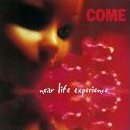 Come – “Near Life Experience” (1996, Matador Records)
Come – “Near Life Experience” (1996, Matador Records)
Come were sliced in half with the departure of its original rhythm section, Sean O’Brien on bass and Arthur Johnson on drums. You don’t know what you’ve got till it’s gone, as they say. Oh, Sean and Arthur, if you ever felt taken for granted as you held up the dark, sharp, steely towers of blues-rock welded by Thalia Zedek and Chris Brokaw’s dual guitars, please accept our apologies! We the humble listeners and critics meant no slight.
The absence of O’Brien and Johnson pulled the foundation out from under Come and turned it into a different band. And a less magnificent band, to be sadly honest. Yet the first post-breakup Come album, Near Life Experience, is not only good but is a must-have work of art. Here we find Zedek and Brokaw still greatly enjoying each other’s company as they crest as songwriters and performers. They recruited an impressive roster of musicians (Nancy Asch, Bundy Brown, Kevin Coultas, Jeff Goddard, Beth Heinberg, John McEntire, Mac McNeilly, Tara Jane O’Neil, and Ed Yazijian) to flesh out their creations, and the results are beautiful. In fact, some of the songs are among the best in the Come repertoire.
Allow me to jump right to the album’s second tune, “Weak as the Moon.” Why this was not all over the radio blows my mind — it ranks among the best songs of 1996. It starts as a lullaby, shifts into a grooving rocker, and is adorned throughout with quotable lyrics (I want to repeat them all verbatim here, but for brevity I command you to listen to it instead). From there we plunge into “Secret Number,” a luscious, dirty little tale of drugs sung rapturously by Brokaw. In prior Come tunes he contributed backing vocals (most notably on “Sad Eyes” from Eleven:Eleven), but here he shines up front. Brokaw then returns two songs later on “Shoot Me First,” another superb tune decorated with details of place and pain that crashes into an unresolved, bitter final chord.
Brokaw’s ventures into the spotlight emphasize the experimental nature of this album. With their old rhythm section gone, he and Zedek seemed to realize that they could never recreate the old Come, so quite reasonably they explored some different avenues. This includes new instrumentation, for example — a trumpet pierces the wall of guitar and percussion at the end of the feverish “Bitten” and a marimba chills out the proceedings during the meditative “Walk On’s.” “Sloe-Eyed,” the album’s closer, foreshadows the more structured, poetic, and yet still compelling direction that Zedek’s music would take on her solo albums.
“Hurricane,” the album’s opener, is the only really disappointing track, but only because it is here where Sean O’Brien and Arthur Johnson are missed the most. The song is driving and impassioned at its heart but is marred by a boring bass line, an overdose of cymbals throughout, and no apparent attempt at rhythm section coordination. In contrast, O’Brien and Johnson no doubt would have joined forces to pummel “Hurricane” with the earth-shaking thunder that it deserves. Ah well. Thalia Zedek, Chris Brokaw, and friends nevertheless pieced together, all in all, a remarkable album in Near Life Experience. (Marc Sommer)
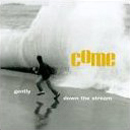 Come – “Gently Down the Stream” (1998, Matador Records)
Come – “Gently Down the Stream” (1998, Matador Records)
Gently Down the Stream, recorded in the summer of 1997 and released the next year, turned out to be Come’s final recording. As always, Thalia Zedek and Chris Brokaw define the band’s sound with their delectable dueling guitars, and here are anchored by the solid rhythm section provided by Winston Bramen on bass and Daniel Coughlin on drums. (Bramen and Coughlin, incidentally, were later featured in one of the several lineups of the Thalia Zedek Band.) Taken together, the dozen songs on Gently Down the Stream clock in at more than an hour, with a couple of them surpassing the eight-minute mark. The band never did write simple, formulaic songs.
“One Piece” is an inviting inauguration; the lazy guitar strumming intermingles with squalling feedback, crashing cymbals, and rolling drums. It works its way into a vigorous arrangement in 3/4 time, and closes with the same lingering instrumentation that heralded it into existence. “Stomp” is just the opposite, its abrupt start cutting to the chase with its sneering vocals and punchy rhythm. Both songs recall the densely layered blues of Come’s earlier recordings.
Ever-shifting tempos are another of Come’s specialties, as evidenced on the slow/fast/slow/fast/slow/fast “Saints Around My Neck” and the slow/fast/slow/mid-tempo “Sorry Too Late.” The latter’s lurching guitar ascends into a brisk interplay with the rest of the instruments, with accents provided by Brokaw’s slide guitar. “I’m sorry that I’m dumb/ Sorry I’m no fun,” sings Zedek, seemingly apologizing to an unnamed target for her apparent transgressions. “Saints Around My Neck” is one of Come’s finest moments. Pristine, prickly notes are elicited from a guitar, one by one, as other accompanying instruments join in, ratcheting up the musical tension until an explosive wall of sound takes over. Zedek’s emotion-packed delivery of a succession of four-syllable lines enhances the music’s expressive impact: “I can’t confess/ With saints around my neck/ I can’t even breathe/ Something is choking me,” she sings toward the song’s climax. This song alone is worth the album’s price of admission.
Come takes a different approach on the penultimate track, “The Former Model.” Sans vocals, the lush instrumentation includes piano and Zedek’s overlapping clarinets. It fits in well with the overarching atmosphere of the record while providing the listener with something different.
Brokaw takes the reigns as lead vocalist on two of the songs, “Recidivist” and “Silk City.” In their own ways, they are both poppier than the rest of the band’s material, though still defined by high-quality ax-slinging. “Recidivist” is my favorite of the two, with Brokaw’s vocals complemented by Zedek’s sparkling guitar melody.
From a personal standpoint, Gently Down the Stream is probably my least-favorite Come album, but that’s mostly only because one of them has to be. There is not a single track on this record that fails to live up to the high musical standards set by the band’s previous recordings, and it contains “Saints Around My Neck,” which is one of Come’s best songs of all. If they had to break up, I guess this was the way to go. (Anna)
Other:
- “Car”/”Last Mistake” 7″ (1991, Sub Pop Records; August installment of Singles Club)
- “Fast Piss Blues”/”I Got the Blues” 7″ (1992, Matador Records)
- “Wrong Side”/”Loin of the Surf”/”SVK” (1994, Matador Records)
- “Cimarron,” appeared on Ain’t Nuthin’ But a She Thing compilation (1995, London Records)
- String EP (1995, Matador Records; CD and vinyl formats had different track listings)
- Steve Wynn, Melting in the Dark (1996, Uni/Zero Hour Records; Come appeared as Wynn’s backing band)
- Secret Number EP (1996, Domino Records)
- “Hurricane,” appeared on Drinking from Puddles compilation (1999, Kill Rock Stars)
- “Do You Love Me?,” appeared on Knitting on the Roof compilation (1999, Knitting Factory Records; songs from “Fiddler on the Roof”)
- John Peel Sessions (unreleased, except for “City of Fun” on the String CDEP
Solo:
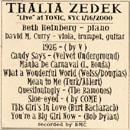 Thalia Zedek – “Live at Tonic, NYC 1/16/2000”
Thalia Zedek – “Live at Tonic, NYC 1/16/2000”
While the idea of birthing a solo album was being nurtured in Zedek’s subconscious mind, she took to playing live shows with a friend or two to provide musical accompaniment. Here she is joined by Beth Heinberg on piano and David M. Curry on viola, trumpet, and second guitar. What this live recording lacks in studio polish it more than makes up for in intimacy – you can hear glasses clink in the background for goodness sake.
Unless you count the version of Come’s “Sloe-eyed” as an original (and I do), this is a collection made up exclusively of covers. I’m not usually particularly interested in cover versions of other people’s songs, but there are certainly some fantastic reworkings here. The set starts off strong with the pairing of V;’s “1926” (the definitive version of which appears on Zedek’s debut album on Matador) and the Velvet Underground’s “Candy Says” (which likewise appears on the You’re a Big Girl Now EP). Both great songs to begin with, they take on their own unique qualities through Zedek’s voice and minimal instrumentation.
Other surefire favorites include “Manha de Carnaval,” the Ramones’ “Questioningly,” and Bob Dylan’s “You’re a Big Girl Now.” Burt Bacharach’s “This Girl’s in Love” is a duet between Zedek and an uncredited mystery girl (the latter of whom sings in Spanish). “What a Wonderful World” surprises, with its optimistic lyrics not exactly paving the way for the heartbreaking subject matter of the debut album that followed. Who wants to be pigeonholed as a Gloomy Gus, though? It’s nice to hear laughter exchanged between Zedek and the audience, and in hearing the interaction with the crowd, the listener is treated to a more personalized experience than can be offered by a studio recording. (Anna)
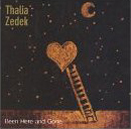 Thalia Zedek – “Been Here and Gone” (2001, Matador Records)
Thalia Zedek – “Been Here and Gone” (2001, Matador Records)
I was living in Berkeley, California when this album was released, and on the day it came out I walked down to Amoeba Records on Telegraph Avenue and excitedly purchased the newly displayed disc. Come was one of my first favorite bands – Eleven:Eleven’s release coincided with my musical coming of age, and for whatever reason that band was one of the few to stick with me throughout my adolescence and into my young adulthood. And from where I was on the West Coast, and with the Internet’s full potential as yet unexploited, I couldn’t hear about much of what Thalia Zedek had been up to since the release of Come’s final record several years earlier. So when I heard about this album, I marked the date on my calendar and couldn’t wait for the day to arrive. When I got home, new CD in hand, I popped the disc into my stereo and started listening. It was like being slugged in the stomach – the album sure does pack an emotional punch! I identified with the lyrical themes a bit too much perhaps, and the music – minimal when necessary and dense when needed – rose to the visceral challenge set by the words.
And it was the opening track that was like a punch square in the gut – “Excommunications (Everybody Knows),” a plaintive song about that long dull ache of the heart familiar to so many, was directed at the person who cruelly and callously left. I had been recently extricated from an equation that was essentially similar, and despite the fact that I was not the one with the achy breaky heart, the piercing thorniness of the lyrics added an extra layer to my guilt and anger and sadness, and, yes, I probably cried. And that is one thing that instantly endears me to any kind of art – the ability to elicit emotions, even those that are unpleasant. I immediately knew that this was going to go down as one of my favorite records of all time.
The theme of loss and ache is the thread that is pulled through the rest of the album, conveyed by Zedek’s unpretentious voice paired with her guitar and masterful accompanying musicians. In one standout, “Desanctified (Full Circle),” there is an almost sensual interaction between the guitars and the piano’s sinister bass line, around which the viola twists like a long, thin snake. Starting off slow, it builds itself up for about two minutes before Zedek’s vocals come into the fray, propelling the song forward. Every key change is gripping. Another gem is “Strong,” in which Zedek’s opening couplet damns her adversary with the proclamation, “You are going to Hell/ You’re gonna be livin’ with yourself.” The lyrics’ ambivalence, buoyed by prickly guitars, is rocked atop choppy waters before gently washing up on shore.
There are three covers on this record: Leonard Cohen’s “Dance Me to the End of Love,” Luis Bonfa’s “Manha de Carnaval,” and V;’s “1926.” At the time of this record’s release, everyone blew a gasket over that last one, and for good reason. The refrain, “Your god hates me,” seemed to get under people’s skin, and it elicited some pretty powerful mental imagery. What the imagery all meant, I was never quite sure, but it made me think of a haggard silent-movie star in silk underwear who hadn’t slept in days, holed up in a motel room, grasping unsuccessfully for some kind of fulfillment in spirits or spirituality or anything else within arm’s reach. Despite the underlying sadness, the song itself glimmers, like a pond in the light of a full moon.
As so much good music does, the songs on this record can zap one’s brain with a short circuit backward down memory lane to intense emotions of yesteryear. For better or for worse, when I listen to it now, so many summers later, it brings back some of the emotional memories of the middle of 2001, but with perspective I can also see the widening horizons and wisdom and forgiveness that heartbreak can bring. (Anna)
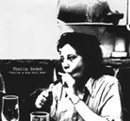 Thalia Zedek – “You’re a Big Girl Now” (2002, Kimchee Records)
Thalia Zedek – “You’re a Big Girl Now” (2002, Kimchee Records)
While the dark musical offerings of Come often drew comparisons to the likes of the Birthday Party, and Been Here and Gone found Zedek likened to such sulky singers as Marianne Faithfull and Nick Cave, You’re a Big Girl Now reveals less moody, more traditional influences, while still remaining true to the sense of sorrow that seems to give rise to her best music.
The album’s title track is one of two covers, this one a rendition of the classic Bob Dylan song. It’s a wisely chosen cover, as its lyrical themes of breaking up and moving on are representative of the subject matter of the album as a whole. Each song seems to convey a cheerless acceptance of a relationship’s dissolution, Zedek letting go of a theretofore important part of her life.
“Everything Unkind,” while not exactly boasting the most uplifting of lyrics (“You wanna go so far away/ where no one cares about you/ or knows your name”), is musically upbeat, its bright guitars and pert piano bringing to mind early Dylan recordings. The sunny instrumentation combines uncomfortably with the remorse expressed by the lyrics.
Next is a spectacular cover of the Velvet Underground’s “Candy Says.” Zedek embraces this song, singing about ambivalence and mind-body estrangement, truly making it her own. David Michael Curry’s viola weaves its way around the notes, lending an enchanting tenderness to the song, just as it does for the following track, “No Substitutions.” Mood-wise, the song is similar to those of Come, but it is more stripped down, minus the roaring wall of sound Zedek created with Brokaw, O’Brien, and Johnson.
“JJ85,” I believe, was resurrected from Zedek’s Uzi days, and it’s difficult to reconcile this minimalist rendering with the brash abrasion of her earlier band. Musically, the only connection to Uzi lies in the tape loops, which are pushed down so low in the mix that they’re barely perceptible anyway.
Closing this six-track offering is “No Fire,” carried by Mel Lederman’s plaintive piano playing and Zedek’s confident guitar strumming. Parting shots are directed to the object of this song: “You can leave me/ Go save somebody else,” “Neither lovers nor friends/ We’re adversaries …/ We used each other well,” and the haunting refrain, “There’s no fire/ for you to burn me down.” Despite an impression of resignation — and maybe even nonchalance — in the face of a relationship in its death throes, the song’s minor keys and the rueful vocal delivery betray a sense of bitterness and regret nonetheless. It neatly recapitulates the five preceding tracks, pulling everything together into a cogent whole. (Anna)
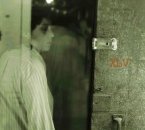 Thalia Zedek – “hell is in hello” (2004, Return to Sender)
Thalia Zedek – “hell is in hello” (2004, Return to Sender)
Limited edition of 2,000. Out of print. Information here (click on discography and check under “Return to Sender” heading).
The following description, which appears on the website, was written by Thalia: I see this collection of songs as kind of like a movie trailer of the last three years of my life of recording and touring. The first track, “Mercury Falls”, is a Come song that I played at the Brattle Theater at my first “big” solo show. I was nervous about the show (opening for Evan Dando), so I enlisted the help of my old friends Chris Brokaw, Daniel Coughlin, and Beth Heinberg, to boost my confidence. Bryce Goggin recorded the show, and later that year ended up producing my first solo record, “Been Here and Gone”, for Matador Records. Everyone who played with me that night ended up playing on that CD, and David Michael Curry (viola) and Daniel Coughlin (drums) have been playing and recording with me ever since! The second track “Temporary Guest”, features the piano playing of Yuko Marata, who I first met and played with while opening for the Willard Grant Conspiracy in England on my first solo European tour. Later on that same tour I met my now good friend Jesus Llorente, when he invited me to play his Tanned Tin festival in Santander. I gave Jesus “Never That Mean” (track 3) to put on his Acuarela label compilation. He later ended up releasing my second solo record on Acuarela in Europe! Three of the other tracks were recorded for Bob Dubrow´s “Pipeline” show. Pipeline is a live show on one of Boston´s best radio stations, WMBR. Bob (along with Andy Hong) runs Kimchee Records who recorded and released my second record , “You´re A Big Girl Now” in the States. Finally, the title of this CD, “Hell is in Hello” is a line from a song called “Wandering Star” that I heard on a William Shattner record. It´s also the name of the last song on a new record that I have coming out on Thrill Jockey in Sept/04 which brings us up to now… I hope that you enjoy this record, Love, Thalia
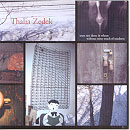 Thalia Zedek – “Trust Not Those in Whom Without Some Touch of Madness” (2004, Thrill Jockey Records)
Thalia Zedek – “Trust Not Those in Whom Without Some Touch of Madness” (2004, Thrill Jockey Records)
In 2004, Thalia Zedek, violist David Michael Curry, and drummer Daniel Coughlin presented the world with this offering, Trust Not Those in Whom Without Some Touch of Madness, a record marked by constantly ratcheted-up tension and thundering intensity. Rather than sounding stripped-down and minimal, the three get impressive mileage from their respective instruments, summoning forth incredible sonic density. Coughlin’s crisp drumming propels Zedek’s masterfully varied guitar work, which is paired with Curry’s bewitching strings and overlain with lyrical themes of departure.
Departure, and water. From song titles like “Ship,” “Sailor,” and “Island Song”; to lyrics about rivers, waves, and lifeboats; to the whale-song facsimile elicited from Curry’s viola in the lead-up to “Hell Is in Hello,” aquatic motifs keep bubbling to the surface. The explosive ebb and flow of the instrumentation rocks the listener back and forth, sometimes gently and sometimes violently.
My personal favorite is “Sailor,” defined by its stuttering intensity, false stops, and roiling drums. The listener is swung to and fro, hypnotized by the music as it plunges ahead into the darkness. Zedek and company execute a series of oddly timed, pregnantly paused start-stops with a seemingly psychic ability – when performing live, they don’t even need to look at one another. The drumming is meticulous and complex, and this is the song that made me realize that Coughlin is one of the finest drummers in rock music.
Returning to the lyrical theme of departure, we have “Bus Stop,” another of the album’s standouts. Its verses are stark, with intricate drumming and accents of viola, giving way to a fuller sound in the chorus. “Island Song” opens with a bang, launching immediately into a mess of arpeggiated guitar battling with heavily distorted viola and overdubbed guitar flourishes; eventually, the song settles into something quieter and more subdued.
Building tension is the name of the game, and the three of them are able to build up a lot of it, especially in “Hell is in Hello,” the closing track. Three minutes into the song, the music all but dissolves into a frenzied wall of sound, barely holding itself together, repeatedly creating loud and chaotic crescendos. This magnificent pandemonium lasts for a good two minutes before we find ourselves safely in the hurricane’s calm eye. Despite nearly coming apart at the seams, these musicians are tight, and here just as in all of the other tracks on the album, they give bold life to their compositions, deftly imbuing them with a gale-force strength that threatens to swallow listeners whole. (Anna)
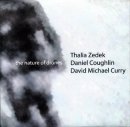 Thalia Zedek, Daniel Coughlin, David Michael Curry – “The Nature of Drones” (2005, self-released)
Thalia Zedek, Daniel Coughlin, David Michael Curry – “The Nature of Drones” (2005, self-released)
When Thalia Zedek, Daniel Coughlin, and David Michael Curry toured Australia in 2005, they sold this self-released CD at their shows. International friendship pays off, because I was lucky enough to have a copy sent to me via airmail by a friend in Sydney. If memory serves correctly, it even arrived on my birthday. Good timing!
All seven songs on this recording are originals, save for the seven-minute rendering of the folk standard “House of the Rising Sun.” An acoustic version of Trust Not Those in Whom’s “Evil Hand” is included, as is an alternate version of “JJ85,” originally released on You’re a Big Girl Now. Two early versions of songs eventually recorded for Liars and Prayers appear on this disc: “Wind” and “Eastern Hue” (which is later rechristened “Green and Blue” on the full-length album). This leaves “Searchlight” and “Too Much Shadow” exclusive to the recording.
“Searchlight” opens this set of songs with Zedek’s bright guitar interwoven with Curry’s plaintive viola. Next is “Wind,” its overdubbed guitars alternating with vague lyrics that seem to be about the fickle and destructive powers of nature – or maybe it’s a metaphor for the September 11, 2001 attacks, or maybe I’m overthinking it. This segues into “Evil Hand (acoustic),” whose unplugged instrumentation is provided only by a richly toned guitar and a harmonica that’s whipped out between verses, Dylan-style.
A delicate cacophony of ethereal viola wails, relatively low in the mix, slowly builds until the guitar and drums launch into the melody of “JJ85.” Absent from this version are the tape loops that haunted the background of the 2002 interpretation of the song. Closing the EP is “Eastern Hue,” a song about a change in geography that sounds slightly lonelier without the benefit of sing-along backing vocals that enhanced the album version.
This was the last recording featuring the power-trio lineup of Zedek, Coughlin, and Curry; the band has since been rounded out by a bass player and a keyboardist. I absolutely loved the pared down yet explosively powerful music created by these three musicians with a psychic three-way connection. I’m grateful that I got to see this incarnation live – they were truly something to behold. (Anna)
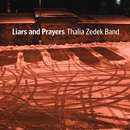 Thalia Zedek Band – “Liars and Prayers” (2008, Thrill Jockey)
Thalia Zedek Band – “Liars and Prayers” (2008, Thrill Jockey)
If you will permit my use of a 50-cent word, Thalia Zedek Band’s Liars and Prayers is a Bush-era masterpiece that expressively captures the Zeitgeist as it was for the great many Americans horrified by government policies carried out in their names. This album’s lyrics are the most pointedly political that Zedek has ever written, addressing such themes as the fear-laden political climate of the new millennium’s first eight years, to more personal (but no less political) topics such as deaths from drug addiction or the lack of access to health care.
Another aspect of the album that adds to its own distinctiveness is the addition of two new musicians: Winston Braman on bass and Mel Lederman on piano add new layers to the band’s sound and nicely complement David Michael Curry’s mournful viola wails and the continually fantastic drumming of Daniel Coughlin. At the band’s core are Zedek’s ever-present guitar stylings and gravelly vocals.
The opening track, “Next Exit,” is one of the more politically overt songs, addressing the war in Iraq and the question of whether and when to withdraw. “There is no way out but out,” sings Zedek before launching into a bare-boned poetic sketch of the Bush years’ with-us-or-against-us, paranoia-heightened atmosphere. All five players fuse together musically, taking the band’s sound further along a trajectory that continues to move forward.
Merging the political and the personal is one of the album’s highlights, “lower allston.” The lyrics are a first-person description of a scene from post-9/11 America, depicting emotions from apathy to suspicion to frustration. It is one of the most musically strong pieces on the record, a high-energy trumpet-laced composition featuring a rare – and magnificent – guitar solo. “Do You Remember” is next, a first-person account of wandering the streets of Manhattan on that fateful day in September 2001 (“There was a TV on the street/ It was like we were inside of it”). The rhythmic pace is unhurried at the outset but slowly gains energy, ramping up to mid-tempo.
Other highlights include “We Don’t Go,” replete with a rousing sing-along chorus; “Green and Blue,” a newer version of “Eastern Hue” whose chilly loneliness is somewhat mitigated by the addition of backing vocals toward the end; and “Stars,” the performance of which is initially quiet and tentative until all of the instruments burst onto the scene, lending heft to the song’s underlying solemnity.
The closing track – and one of the most powerful – is “Begin to Exhume.” Another of the more explicitly political songs, its angry delivery seems to be addressed directly to George W. Bush (“Show us the body/ The thousands of bodies/ And the ones you tried to hide/ That you buried deep in lies”). High energy, with key changes and tempo changes, the song, and with it, the album, comes to a jarringly abrupt ending – unlike the Bush era, unfortunately. Even with those years nominally behind us, it still seems that we are stuck within its unending coda. (Anna)
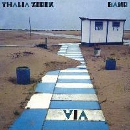 Thalia Zedek Band – “Via” (2013, Thrill Jockey)
Thalia Zedek Band – “Via” (2013, Thrill Jockey)
The cover photo reveals a path that initially seems straight, but is obscured by sand and diverges from its direct path farther in the distance. Thalia Zedek Band’s new album examines the connection between past and present, rooted in metaphors that cast life as a journey. Whether we’re walking away or coming home, memories might tie us to places in our pasts, possibly holding us back from our destinations.
“The future cannot change the past,” Zedek declares in the opening track, “Walk Away.” But, while the trajectory of our lives may be linear, Zedek’s songs are often cyclical, building in intensity only to be routinely deflated and reborn, moderating back and forth from delicate to forceful. One of the album’s standout tracks, “Winning Hand,” builds itself up slowly. Initially sinister and foreboding, it ramps up the raucousness, bursting into an energetic plateau, only to return suddenly to muted drums, sparse guitar, and serpentine viola. The song continually dives back under the earth’s surface, only to emerge from the ground, rebirthing itself like snakes bursting forth from hibernation.
Other songs start off simpler and then add layers; “In This World” initiates itself with crisp acoustic sounds, while “Walk Away” begins plaintively. Both tracks add instruments, which emerge onto the soundscape to add strength and heft. Guitar, bass, and drums form a core, while piano and viola flesh the music out.
“Straight and Strong,” whose every syllable is kept aloft by guitars and which features rare vocal harmonizing, includes a guitar solo that threads itself into the song’s fabric. Zedek’s judicious use of guitar solos is refreshing: Rather than thrusting the guitar into the spotlight and shoving everything else into the background, Zedek’s solos tend not to be separated entities but rather are integrated into the greater whole, weaving themselves into the music’s larger tapestry. They are guitar solos for those of us who appreciate the guitar as a collaborative instrument, not one that sits atop a hierarchy.
The album’s finale, “Want You to Know,” is a classic Zedek closing track: slightly distorted vocals, strategic feedback, the slow build toward chaos. The song starts off soft, but repeatedly threatens to tear apart at the seams before settling back into its original arpeggiated quietude, with a viola looming menacingly in the background. Before you know it, the music has sprung back into controlled cacophony, eventually fading out and softly landing amid squeals of feedback.
Nine songs clock in at just under 50 minutes, following a path in which the listener visits ghosts from the past, says goodbye to dear ones, and is reminded that life is finite. While a sense of loss pervades many of the lyrics, so too does a sense of hope. Life may be finite, but we also have each other — friends, angels, and those whose respect we’ve earned. (Anna)
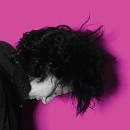 Thalia Zedek Band – “Six” (2014, Thrill Jockey)
Thalia Zedek Band – “Six” (2014, Thrill Jockey)
Review coming soon. (Anna)
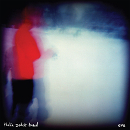 Thalia Zedek Band – “Eve” (2016, Thrill Jockey)
Thalia Zedek Band – “Eve” (2016, Thrill Jockey)
Review coming soon.
 Thalia Zedek Band – “Fighting Season” (2018, Thrill Jockey)
Thalia Zedek Band – “Fighting Season” (2018, Thrill Jockey)
Review coming soon.
E
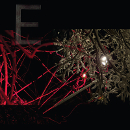 E – “E” (2016, Thrill Jockey)
E – “E” (2016, Thrill Jockey)
Review coming soon.
 E – “Negative Work” (2018, Thrill Jockey)
E – “Negative Work” (2018, Thrill Jockey)
Review coming soon.